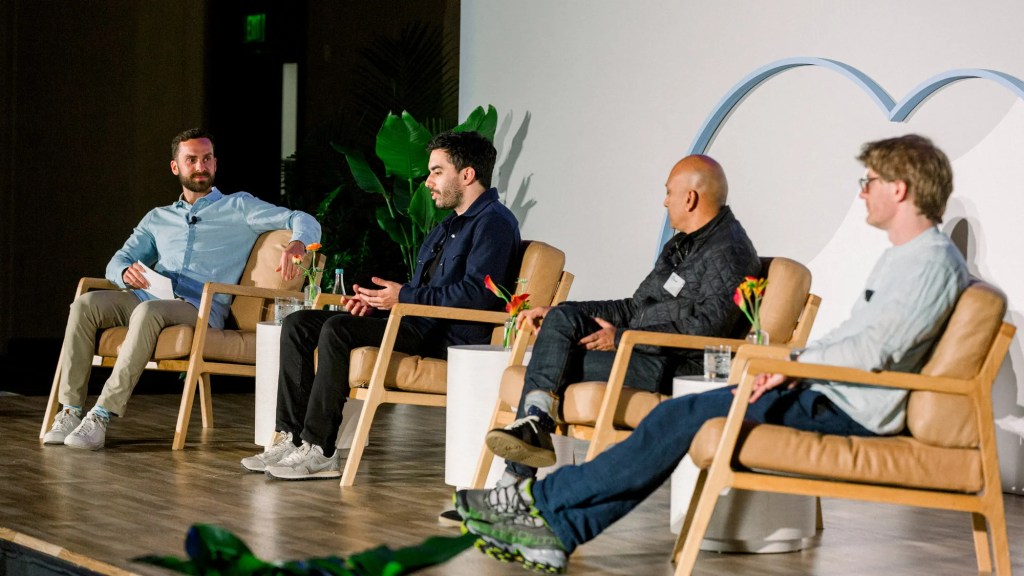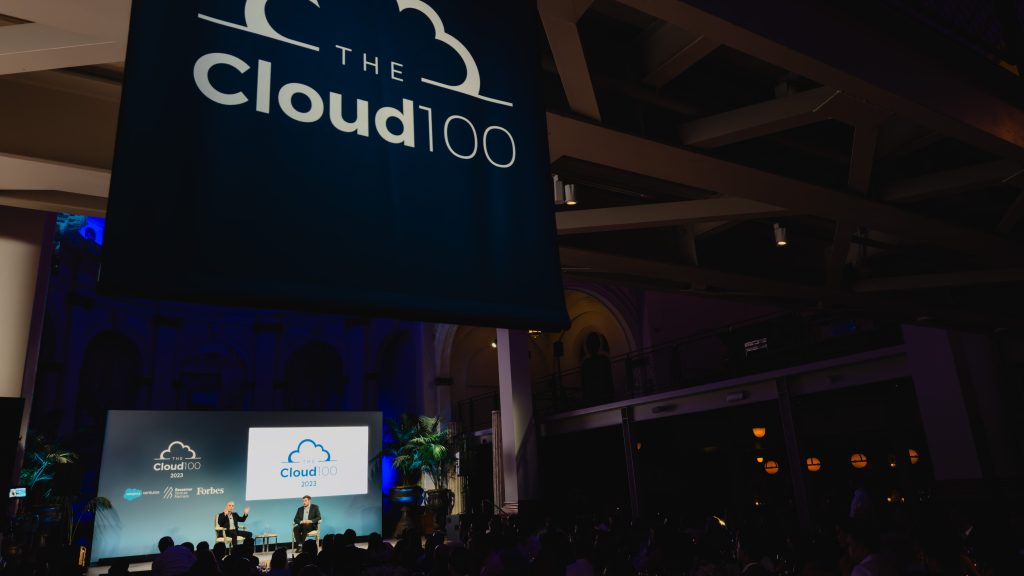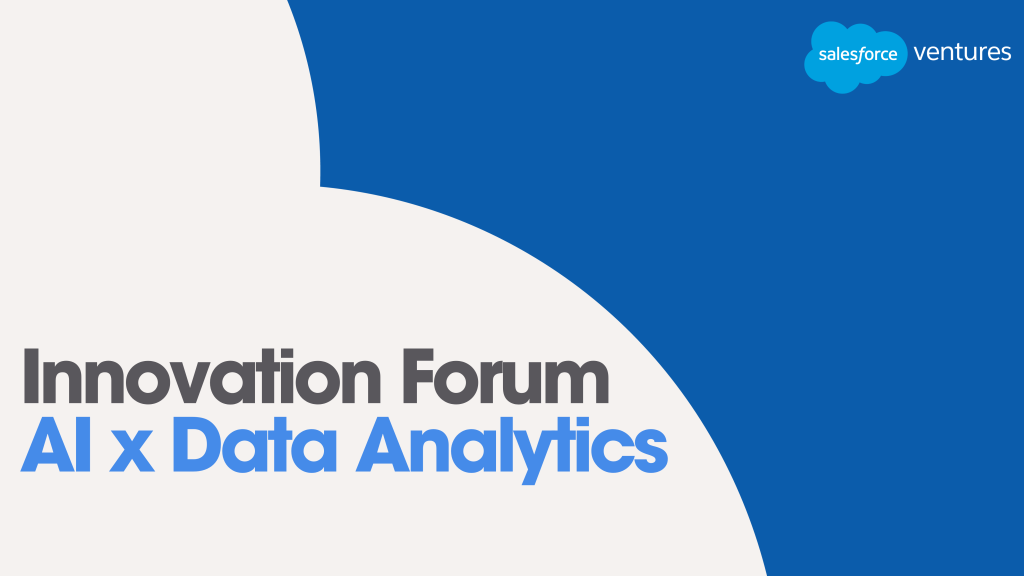Salesforce Ventures portfolio companies Mistral AI and Hugging Face were recently invited to participate in World Tour Paris—Salesforce’s annual event featuring 12k+ Salesforce experts, customers, partners, NGOs, and members of the wider Salesforce ecosystem.
Mistral CEO Arthur Mensch and Hugging Face Head of Sales Bassem Asseh spoke on a panel and participated in roundtable discussions with executives from McKinsey, Adecco Group, and Accor Group, among others. Topics included recent innovations in generative AI, trends around enterprise implementation, emerging use cases for generative AI technology, and much more. The discussions featured great insights for builders, executives, and enthusiasts alike. Here were a few of our favorite takeaways.
The Transition From Experimentation to Production
Generative AI adoption across enterprises has been “massive” according to Gloria Macias, a partner at McKinsey who spoke on the panel. McKinsey’s 2023 State of AI survey found that roughly one-third of respondents were already utilizing generative AI, and 60% of leading companies that had adopted conventional AI were now using generative AI.
While this enthusiasm has translated into broad experimentation, the panelists agreed that 2024 is the year we see a transition from experimentation to scalable production use cases. Pierre Matuchet, the SVP of IT & Digital Transformation at Adecco, explained how generative AI allowed his company to deploy a new product feature across multiple geographies in under a month.
“Our CV Maker tool, which allows job seekers to verbally describe their professional background, only took 3-4 weeks of development with generative AI,” Pierre explained. “AI is becoming a real tool for inclusion with a multilingual dimension. We consider AI as a global brain to develop and integrate into all our applications. Now it’s a matter of moving to an execution phase and scaling up.”
Viability of Multi-LLM and Hybrid Approaches
As enterprises make the transition from experimentation to production, many expressed caution around becoming overly reliant on a single vendor’s offerings due to vendor lock-in risk and technology obsolescence risks. During the panel, Pierre detailed Adecco’s strategy to adopt a multi-vendor approach for LLMs to mitigate vendor lock-in risk. Nicolas Bragard, Corporate CIO at Esker France, also expressed apprehension during a roundtable discussion about building critical applications around a single LLM provider’s technology, as their models could become obsolete when competitors release newer, more capable versions.
Arthur from Mistral advocated for enterprises to explore multiple smaller, specialized models rather than solely relying on large models. He contended that an ensemble of smaller models can match the performance of giant models while offering greater flexibility and niche customization capabilities. Echoing this perspective, Bassem from Hugging Face endorsed leveraging smaller open-source models that can be fine-tuned on an enterprise’s proprietary data to reduce vendor dependency.
Emerging Enterprise Use Cases
The panel and executive roundtable discussions shed light on several key use cases where enterprises are adopting generative AI to drive ROI. Arthur identified four horizontal areas where he’s seeing widespread generative AI adoption: internal knowledge management through conversational assistants, software development, customer relations, and marketing.
Alix Boulnois, Chief Digital Officer at Accor Group, classified her organization’s AI initiatives into five categories: marketing with micro-personalization, enhancing customer experience, decision-making support, enabling developer productivity, and ESG initiatives.
Salesforce Ventures believes startups that can grasp how enterprises are leveraging generative AI capabilities, and deliver tailored offerings aligned with some of these high-value use cases, possess immense potential to capitalize on the rapidly growing market demand.
Challenges to AI Adoption
While there’s immense enthusiasm surrounding generative AI, several enterprise leaders sounded a note of caution regarding the challenges that still need to be addressed for broad adoption. Key hurdles voiced by the panelists and other senior leaders included data preparedness and quality, uncertainty around optimal AI team structures within organizations (i.e. whether a centralized AI team or decentralized AI units embedded in different functions), the significant costs involved in implementation and maintenance, and lack of clarity around ROI.
On the latter point, multiple senior executives shared that it’s currently extremely difficult to extrapolate the costs of a proof-of-concept in a controlled environment to full-scale production roll-outs.
Adoption Strategies
During the panel, Bassem and Alix emphasized that identifying the right use case is one of the most critical success factors for enterprise AI adoption: companies should pinpoint a specific business need rather than blindly implementing generative AI for the sake of novelty and buzz.
Gloria noted that change management was a key component of McKinsey’s AI implementation projects, indicating that close collaboration with stakeholders and end-business users is paramount to driving adoption and assuaging fears around generative AI.
Bassem proposed a three-pronged framework for successful enterprise AI adoption:
- Have access to appropriate and clean data,
- Possess the necessary infrastructure to support an AI deployment, and
- Cultivate the requisite AI competencies and upskill the workforce.
On the last point, Bassem said companies must proactively “board the AI train.” Institutional AI knowledge compounds over time, so getting started early allows organizations to better position themselves for future AI capabilities and applications.
Conclusion
Paris World Tour provided a great opportunity to learn what leading enterprise leaders are thinking and doing as it relates to generative AI. It was an honor to provide a platform for members of our own portfolio to participate in these crucial conversations as we move deeper into the generative AI age.
At Salesforce Ventures, we embrace generative AI and are excited to collaborate with the most ambitious entrepreneurs in this space. Our generative AI portfolio includes leading companies such as Anthropic, Cohere, Hugging Face, Runway, Mistral AI, Together AI, Tribble, You.com, Typeface, AutogenAI, and Pano, among others.
_
If you’re a founder building in AI, we’d love to talk. Salesforce Ventures is currently investing in best-in-class AI tooling and horizontal or vertical applications. To learn more, visit our website or email me at sam@salesforceventures.com.
If you’re an enterprise leader experimenting or innovating with AI, we’d also love to talk. To learn more, email me at taz@salesforceventures.com.






